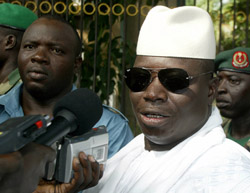On July 22, Gambian President Yahya Jammeh once again went after journalists in an interview on the country’s only state-run television station. The president made a thinly veiled threat toward six independent journalists currently facing “seditious publication” and “criminal defamation” charges in the country: “So they think they can hide behind so-called press freedom and violate the law and get away with it. They got it wrong this time. We are going to prosecute them to the letter,” Jammeh said.
He stepped back and took a broader swing: “Any journalist who thinks that he or she can write whatever he or she wants and go free is making a big mistake. If anybody is caught, he will be severely dealt with.”
The reason for these charges and threats? The six journalists republished a press release issued by the Gambian Press Union last month criticizing televised comments Jammeh made regarding the 2004 murder of prominent Gambian journalist Deyda Hydara.
As the only Gambian enjoying full press freedom rights in the country, Jammeh has overstepped his bounds by passing judgment on journalists. He has also proven the partiality of our already weakened judicial system in which judges defend the president’s interests. We expect Jammeh to address his government’s appalling human rights and democratic credentials, investigate Hydara’s murder, the disappearance of Chief Ebrima Manneh, and fix the alarming poverty rate instead of issuing threats and calling local journalists “rat pieces.”
One thing is certain about the Gambian president–his words and deeds hardly correlate. This is the same president who said two years ago that “even if Yahya Jammeh intimidates you for defending somebody, go to the press.” By saying this, he seemed to be recognizing the press as a mirror and potential force for social change. Why then is his government punishing six journalists for merely defending Hydara, whose death has not been investigated by Gambian authorities?
During his televised comments, Jammeh accused journalists of tarnishing the government’s image. In essence, his government is responsible for tarnishing its own image. By seizing all powers and rights of citizens, we cannot remain mute. The onus lies on Jammeh to restore our country’s lost dignity. For the Gambia to enjoy participatory democracy and justice, and to command respect from the civilized world, it must demonstrate a commitment to free speech.
Musa Saidykhan, former editor of banned newspaper The Independent, fled the Gambia in 2008 and resettled in the United States. The
